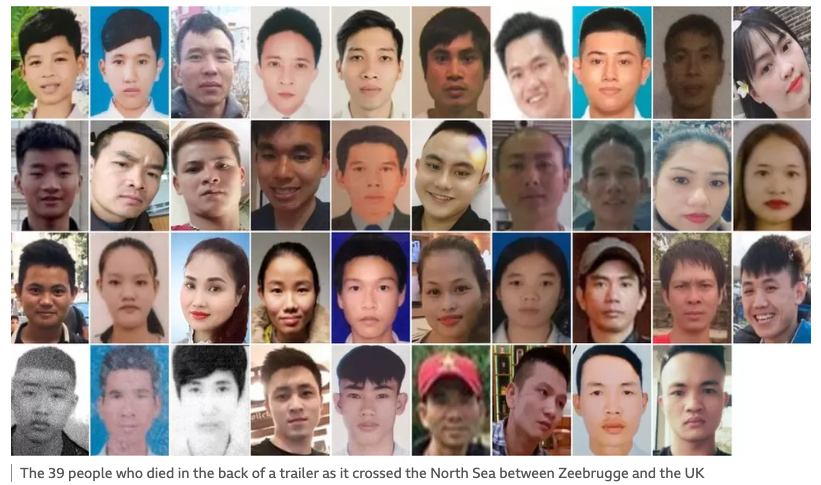RE:Wildling
Musiktheater HfM, Nürnburg

- Date
- 10.02.2024 19:30 - 10.02.2034
- Url
- https://www.hfm-nuernberg.de/veranstaltungen/termin/2024-02-09-musiktheater-trip-to-a-foreign-land
Description
Lorry 39 | Musiktheater HfM Nürnburg
Why Lorry 39 is music theatre. Lorry 39 is an artistic exploration of the dismay and anger left by the news of the tragic event of 22 and 23 October 2019. The agony in the dark, blazing hot container that is incomprehensible to us; the lies and pressures that led to this journey; the fatal consequences of small oversights, coincidences and mistakes; the angry disappointment that after Parndorf something like this could happen again. In the face of this, even the language of protocol fails. The music takes over - music theatre emerges. There, anger, disappointment and speechlessness become a productive "disagreement" under tension, which becomes the pulse of music theatre and offers the possibility of confrontation without having to struggle for answers.
On the facts, 39 people lost their lives in a refrigerated truck parked in Essex in the overnight hours between 22 and 23 October 2019. The causes of death were asphyxiation and overheating. It is believed that some among them were victims of human trafficking, while others had paid smugglers to get to the UK.
About the situation. We are left in the dark about what is happening outside the container. No signal penetrates the thermally insulated metal walls. The smartphone is only a torch and offline witness. The journey is erratic. Tugboats do not use a direct route. Man as cargo.
To the form. With the closing of the container doors begins a continuous change in sound, language and breathing that continues into the final curtain. Insular arias confront the river. Tinny, echoing pop music creates rare moments of breathing space in the trembling, exhausted sound world of the container.
About the libretto. The libretto is more music than text. It was developed along small melodic and rhythmic figures of speech. All the dialogues revolve around themselves. Every question already knows the answer. One speaks for the sake of speaking. One speaks in order to be human. The language is short and colloquial. It limps and has errors. It has references without resolution. It is borrowed from English and seeks proximity to pop.
To music. The music takes over the language of the text, intersperses it with counterpoint or lets its impulses fade into the void. It gives body and expression to the skeleton of the text. Glissandi sliding into abysses, flutes dripping through the metal wall, casual smartphone beats, zoomed-in breathing sounds, half-remembered pop melodies and Morse code-like hammering dissolve the boundaries between direct mimesis and abstract sound development. The expression of voice and music meanders and hooks - between protocol and desperate struggle for air. In places, it overlaps narrative and compositional ratiocination. The music is full of spontaneous decisions. Seemingly wrong sounds in the wrong place reveal the hopelessness of a situation. By exposing oneself to the music, it physically deciphers itself to you. The music of Lorry 39 knows no metaphors or symbols that could be misunderstood.
On Lampedusa, Parndorf, Calais, Essex, Melilla, Kittsee, ...
What music theatre means to us. Musical theatre knows no spoiler warnings. On the contrary, you usually read the plot before it begins. In Lorry 39, it resembles a one-way street whose end is clearly in sight - no unannounced deus ex machina turns the outcome of the tragedy. The attraction of music theatre lies not in the anticipation of a plot, but in its ability to create a psychogram - that of the composer, the singer, the stage characters and the listener at the same time. Music makes this possible. Music can contradict and embrace itself in the most natural way, tell a life story in one sound, seismographically register the most subtle emotions or make us euphoric within just a few moments. Their drama and energy are created through transformation and contrast, between stylisation and immediate mimesis. Music gives music theatre its narrative logic, its expression and its specific temporality. Through it, music theatre can be experienced - analytically, associatively or through physical "going along". The principle of music as a movement of contrast, approach, tension and relaxation becomes the principle of music theatre in general: music theatre takes place where text, music and scene complement or even double each other, but especially where its components diverge, where something is seemingly not "right". To perceive this productive incongruity as such is to experience it with music theatre. This also includes drifting off into the music, the nervous knee trembling of the person sitting next to you, the brief emptiness after the final curtain, the re-reading of a background text or the inner reverberation of a text.
Aufführungen: Freitag, 09.02.2024, 19:30
Samstag, 10.02.2024, 19:30
Sonntag, 11.02.2024, 19:30
Hochschule für Musik Nürnberg Veilhofstr. 34, 90489 Nürnberg, Orchestersaal
Komponistin: Ying Wang
Libretto: Andreas Karl
Regie: Susanne Frey
Ausstattung: Linda Siegismund
Einstudierung: Prof. Nina Janßen-Deinzer
Leitung: Dirigierklasse Prof. Guido J. Rumstadt
Bühne & Kostüm: Christian Wiehle
Video: Stefan Bischoff
Dramatugie: Annika Hertwig
Kooperation mit dem SWR Experimentalstudio und Theater Freiburg.
Location information
Germany, Bavaria, Nuremberg, 90489, Veilhofstraße, 34
- Street
- Veilhofstraße 34
- City
- 90489 Nürnberg
- County
- Bayern
- Country
- Germany